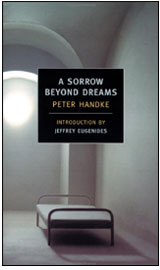Books |
A Sorrow Beyond Dreams
Peter Handke
By
Published: Feb 17, 2009
Category:
Fiction
The Sunday edition of the Kärnter Volkszeitung carried the following item under ‘Local News’: ‘In the village of A. (G. township), a housewife, aged 51, committed suicide on Friday night by taking an overdose of sleeping pills.’
That’s the opening of Peter Handke’s 96-page account about the suicide of his mother. It takes perhaps an hour to read. But like the best of Handke, A Sorrow Beyond Dreams stays with you, both as an example of great writing and, even more, as a chronicle of a representative German life.
Handke is not widely known in America, which may be just as well — he has always courted controversy and taken unpopular positions. In 1966, when he was just 24, he achieved the kind of reaction that only a few playwrights crave; during a performance of his play ”Offending the Audience,” theatergoers actually become so infuriated that they rushed the stage. The next year, at a conference at Princeton University, he accused Günter Grass and Heinrich Boll of writing “mere description” about social issues. In 1996, he wrote that Western media demonized the Serbs during the Balkan War. And in 2006, at the funeral of Slobodan Milosaevic, Handke spoke — in Serbian — in support of the man whom many regard as a war criminal.
Long before his recent unpopularity, Handke was the Bright Young Man of German writing. “A Sorrow Beyond Dreams”, written in two months in 1972, is the best argument for that exalted reputation. Ironically, it’s not a literary document. It’s a horror story, pure and simple.
Handke’s mother — he never gives her a name — grew up happy. Her father had done what no peasant in his family had managed: He owned a house. He saved prodigiously, lost his money in the inflation of the 1920s; he scrimped again, only to lose his money in the Depression. Still, his daughter was “high-spirited”, an attractive girl with no sense that adulthood for uneducated women was a crushing series of reduced expectations.
So Handke’s mother didn’t see World War II as a nightmare; for her, it was an adventure that broke the bonds of her limited world. (“’We were kind of excited,’ my mother told me. ‘For the first time, people did things together.’”) She met a married soldier, became pregnant (with Peter), then sealed her fate with a marriage to a soldier she didn’t love. Another child followed. And a self-administered abortion.
Her life was split; she had “a certain chic”, but couldn’t find a way to express it fully. And then, after the war, the “speechless moments of terror” begin. The husband drank. Which led to wife-beating. She kept silent, she “had learned her place.”
Poverty ground her down. I’ll spare you the account, which is exactingly described — it’s real poverty, not the movie kind. Handke struggles to remember the big things, the important things, but what he mostly finds is small, and all the sadder for smallness: “From her childhood days my mother had a swollen scar on her index finger; I held onto it when I walked beside her.”
It’s not a straight trip to the bottom. There’s a sudden, final flowering. “My mother had not been crushed for good,” Handke reports. She began to read, took an interest in politics. “She learned to talk about herself; and with each book she had more ideas on the subject. Little by little, I learned something about her.”
It was too late. An animal despair overwhelmed her, sank her; her sorrow was so deep no one could rescue her. When he heard of her suicide, Handke writes that he was “beside myself with pride” — she’d found a way out.
And so he began to evoke her life:
My mother has been dead for almost seven weeks; I had better get to work before the need to write about her . . . dies away and I fall back into the dull speechlessness with which I reacted to the news of her suicide.
He does get beyond “dull speechlessness”. But can a writer who sees himself as a writing machine break through to his true feelings? Will he get beyond the standard emotions to communicate the horror of a thwarted life? How, in the end, does a son tell the story of a mother whose only triumph may have been her death?
No account I have ever read of a woman’s life by her child deals with such questions. “A Sorrow Beyond Dreams” stands alone.
To buy “A Sorrow Beyond Dreams” from Amazon.com, click here.


